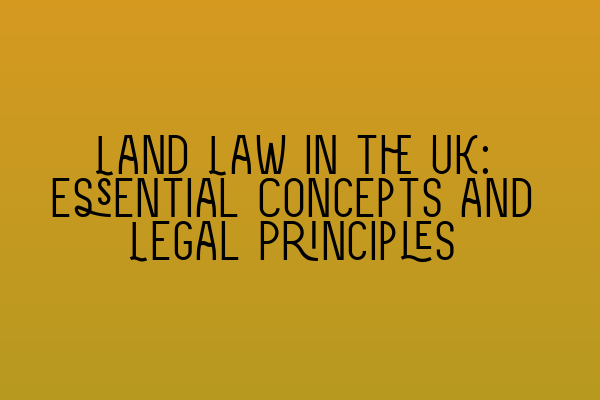Land Law in the UK: Essential Concepts and Legal Principles
Welcome to the SQE Property Law blog, where we discuss the important legal aspects of property and land law in the United Kingdom. In this article, we will explore the essential concepts and legal principles of land law, providing you with a comprehensive overview of this complex area of law.
1. Introduction to Land Law
Land law is a fundamental area of law that governs the rights and interests in land and property. It encompasses various legal principles that regulate the ownership, use, and transfer of land and property.
Whether you are a property owner, a tenant, or a property developer, having a good understanding of land law is essential to protect your rights and ensure compliance with legal requirements. Now, let’s dive deeper into the key concepts and principles of land law!
2. The Concept of Property Ownership
Property ownership is at the core of land law. There are two main types of property ownership in the UK:
- Freehold: This is the absolute ownership of land and property, with no time constraints or limitations.
- Leasehold: In this type of ownership, the land or property is leased for a specific period, usually long-term.
It is crucial to understand the rights and responsibilities associated with each type of ownership to ensure proper management and utilization of your property.
3. Title and Registration
Every piece of land and property in the UK is registered with the Land Registry. This registration process provides legal recognition of the ownership and boundaries of the land.
Understanding the concept of title and the importance of registration is essential to establish your legal rights and protect against disputes or fraudulent claims over the property. For more information on the registration process, you can read our related article on Misrepresentation in Contracts: Unveiling Deceptive Practices.
4. Rights and Interests in Land
Land law recognizes various rights and interests that can exist alongside property ownership. These include:
- Easements: The right to use another person’s land for a particular purpose, such as access or drainage.
- Covenants: Agreement between property owners regarding the use or restrictions of the land.
- Restrictive Covenants: Limitations on the use of land or property.
- Profit a Prendre: The right to extract resources from another person’s land, such as minerals or timber.
Having a clear understanding of these rights and interests will help you navigate any potential disputes or conflicting claims with other parties.
5. Transferring and Acquiring Land
In land law, the transfer and acquisition of land involve a wide range of legal processes and considerations. It is crucial to follow the correct procedures and comply with legal requirements to ensure a valid and enforceable transaction.
When acquiring or selling land, it is essential to obtain legal advice and conduct thorough due diligence to identify any potential issues or encumbrances. For more information on the legal aspects of contracts, you can refer to our related articles on A Closer Look at SQE Contract Law Syllabus and SQE Contract Law: Analyzing Landmark Cases and Influential Judicial Decisions.
6. Landlord and Tenant Law
Landlord and tenant law governs the relationship between property owners (landlords) and those who occupy or rent their properties (tenants). It outlines the rights and responsibilities of both parties, including rent payments, repairs, evictions, and lease renewals.
Whether you are a landlord or a tenant, understanding your legal obligations is crucial for a smooth and lawful tenancy arrangement. Seek legal advice to ensure compliance with the relevant legislation and to protect your rights as a landlord or tenant.
7. Conclusion
Land law is a complex area of law that underpins property ownership and rights in the UK. Having a good understanding of the essential concepts and legal principles of land law is vital for property owners, tenants, and property developers.
By familiarizing yourself with the concepts discussed in this article, you will be better equipped to navigate the legal complexities and potential disputes that may arise in relation to land and property. For more insights on contract law and related topics, you can read our related articles on Contract Law for Services: Key Considerations and Best Practices and Understanding Contractual Capacity: Rights and Limitations.
Remember, it is always advisable to seek professional legal advice when dealing with land-related matters to ensure compliance with the law and protect your rights.
